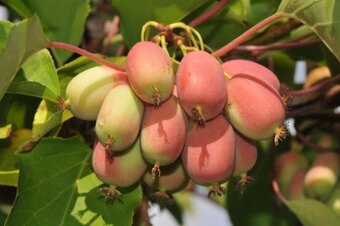Mini kiwi fruit bred at WULS-SGGW to be fund on store shelves
"Sales in shops and markets of the variety of new Polish wholesale fruit is a chance for consumers to get familiar with their taste and with the possibilities of their use in the daily diet. We hope that if the consumers like the fruit, they will look for it on store shelves again next year. The nutritional value and an interesting taste of the fruit make it a valuable extension of the existing offer in our market "- says Dr. hab. Peter Latocha, the creator of the new Polish variety of Actinidia.
Dr. Peter Latocha emphasizes that there are test conducted that aim at fine-tuning the commodity technology to grow the plant. More plantations are started. The aim of the study is to select the best varieties and optimize cultivation in order to obtain good quality fruit.
Searching for new plants that expand the assortment of the market in fruit and vegetables of new species or varieties that are characterized by high nutritional and health-related values, and at the same time fit in well in terms of Polish soil and climate conditions has been in recent years one of the most important directions of research in horticulture.
Perennial Vine (Actinidiaarguta), whose fruits are called depending on the country: hardy kiwifruit, kiwiberry, kiwai, kiwibes or mini kiwi perfectly meets these expectations.
Until now, the plant was used as an ornamental plant in our gardens, but for some time it has begun to be more widely grown on commercial plantations in many European countries. Mini kiwi fruit are much smaller than kiwi fruit, but have a smooth edible skin and can be consumed entirely. They have an attractive taste and contain a lot of elements that are beneficial for health, such as vitamin C, lutein, polyphenols and proteolytic enzyme - actinidin. The fruit has a significant effect regulating the digestive system and have a protective effect on the cardiovascular system. Thanks to its small size, smooth skin and high health-enhancing values, these fruits are treated as a valuable and easy snack intake around the world. The plants are almost free from diseases and pests, and are perfect for organic cultivation which further increases their value.
The study conducted at the Department of Environmental Protection at the Faculty of Horticulture, Biotechnology and Landscape Architecture of WULS-SGGW for several years by dr hab. Peter Latocha resulted not only in recognition of the possibility of growing this plant in Poland, but also breeding new varieties with attractive fruit.
The "Bingo" variety just gets to our stores. Sensory studies conducted so far confirmed that the mini kiwi fruits have an appealing taste and are well received by Polish consumers.
This fact indicates that the fruit will be accepted on the Polish market. Cultivation of Actinidia can also be very profitable even for smaller growers, because at current wholesale prices of these fruits in Europe, the potential income from 1 ha of fully fruitful plantations can be as high as 200-250 thousand PLN.



